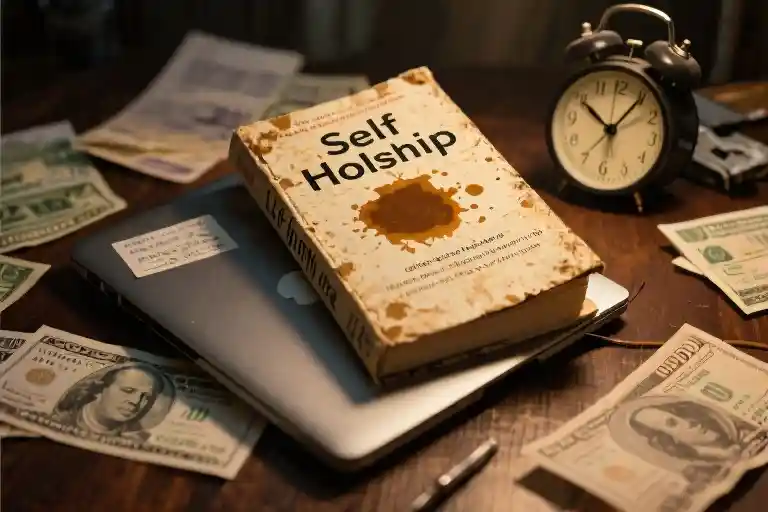The other day I found myself staring at my third overdraft notification this month while simultaneously watching a YouTube ad for some guru’s “Atomic Habits Masterclass.” The guy was straight-faced telling me how waking up at 4:30 AM changed his life – as if circadian rhythms were the only thing standing between me and financial freedom. My coffee-stained copy of The 5 AM Club makes for a decent laptop stand though, so there’s that.
Here’s the uncomfortable truth nobody puts on those pastel-colored book covers: personal development has become the luxury goods industry of emotional labor. We’re being sold productivity porn by people whose idea of “hardship” is forgetting their coconut water at a Bali co-working space. Meanwhile, the rest of us are out here trying to manifest basic things like “having dental insurance” or “not crying in the grocery store parking lot.”
I used to devour these books like they held some secret formula. Then I realized most authors writing about “the power of less” have never actually lived paycheck to paycheck. Their version of minimalism involves owning three perfect cashmere sweaters; mine involves hoping the laundromat doesn’t eat my last decent shirt. Their “digital detox” means unplugging from their team of virtual assistants; mine means my phone got shut off again.
This isn’t about bashing self-improvement – I still believe in growth. But there’s something deeply cynical about an industry that packages privilege as wisdom and sells it back to people drowning in late-stage capitalism. The next time someone tells me all I need is a gratitude journal and a vision board, I might accidentally manifest the sudden urge to throw something.
So let’s talk about what happens when inspirational quotes meet rent day. When “abundance mindset” collides with overdraft fees. Because somewhere between the Instagram affirmations and my fourth cup of discount coffee, I realized: maybe the problem isn’t my lack of discipline – maybe it’s that the rulebook was written by people playing a completely different game.
The Mythology of Self-Help Gurus
There’s something almost religious about how we worship self-help authors these days. We buy their books like sacred texts, hang on their every word as if they’re prophets, and try to emulate their morning routines like they’re holy rituals. But have you ever stopped to look behind the curtain at who’s actually writing these books about ‘radical life transformation’?
Let’s play a quick game of self-help author bingo. Former tech CEO? Check. Ivy League educated? Check. Somehow makes seven figures while only working two hours a day from a beach in Costa Rica? Big check. These aren’t your average people who figured out how to get through the daily grind – they’re already outliers before they even write page one.
Take the whole ‘passive income’ mythology. The books make it sound like you can set up some automated system and then spend your days doing yoga on a Bali cliffside. What they don’t show you is the team of ten people behind that ‘solopreneur’ – the virtual assistants, the ghostwriters, the video editors, the business managers. That Instagram post showing them ‘working’ from a hammock? Their team probably spent eight hours setting up that ‘spontaneous’ shot.
And let’s talk about timing. Notice how many of these gurus sold their startups right before the market peaked? Or happened to launch their YouTube channel during that sweet spot when the algorithm favored long-form motivational content? Their success often depends as much on luck and timing as any ‘system’ they’re selling you.
What really gets me is the credentials shuffle. That ‘former Fortune 500 consultant’ might have been an unpaid intern for three months. The ‘bestselling author’ could mean they sold 5,000 copies – mostly to their email list. The TED Talk? Probably at a local TEDx event that anyone can organize.
Here’s the uncomfortable truth: The self-help industry doesn’t make money by solving your problems. It makes money by keeping you just hopeful enough to buy the next book, the next course, the next mastermind group. The business model depends on you never quite ‘making it’ so you keep coming back for more solutions.
I’m not saying these people are frauds (well, some definitely are). Many genuinely believe in what they’re teaching. But there’s a fundamental disconnect between their reality and yours. When your biggest concern is making rent and they’re worried about which villa to rent in Tulum next winter, can their advice really apply to your life?
Next time you see one of those perfectly curated author bios, remember – you’re seeing the highlight reel, not the behind-the-scenes footage. And more importantly, your worth isn’t measured by how closely you can imitate someone else’s improbable success story.
The Spiritual Buffet We Can’t Afford
Let’s talk about that magical moment when you decide to take control of your life. You know the drill – buy the pastel-colored book, set your alarm for 4:55 AM, brew some organic mushroom coffee, and prepare to ascend to your highest self. By 7:03 AM you’re already fantasizing about quitting your job to become a breathwork facilitator in Costa Rica. Then your actual life hits like a freight train when you oversleep, spill coffee on your only clean shirt, and realize your bank account has entered the negative digits again.
Here’s what they don’t tell you in those glossy personal development books: spiritual enlightenment has a minimum wage requirement. While wellness influencers preach about ‘abundance consciousness,’ the rest of us are practicing ‘bill consciousness’ – that panicky moment when you mentally calculate which payments can slide this month. I once tried following a famous CEO’s morning routine only to get written up at my retail job for yawning during a customer interaction. Turns out, operating on three hours of sleep isn’t ‘biohacking’ when you can’t afford a red light therapy bed.
The income disparity between self-help authors and their readers would be hilarious if it weren’t so tragic. A recent survey found that 78% of bestselling personal development authors earn over $500,000 annually, while 62% of their readers make less than $50,000. That’s like a Michelin-star chef writing a cookbook for people who only own a microwave. Their ‘simple’ advice about hiring virtual assistants or taking six-month sabbaticals hits different when your version of self-care is deciding which utility bill to pay late.
What makes this particularly insidious is how these programs pathologize normal financial stress. Can’t manifest your dream life? Must be your ‘limiting beliefs.’ Struggling to implement productivity systems? You’re just not ‘committed enough.’ Never mind that the author’s ‘hustle’ involved inheriting a trust fund while yours involves deciding whether to fix your car’s transmission or see a dentist this year.
Here’s the dirty little secret those $37 online courses won’t tell you: poverty is the ultimate productivity killer. No amount of gratitude journaling changes the cognitive toll of financial precarity. Studies show that scarcity mentality isn’t some spiritual deficiency – it’s what happens when your brain is overloaded with survival calculations. The real ‘abundance mindset’ is recognizing that sometimes the obstacle isn’t your attitude, it’s your material conditions.
So the next time some guru tells you to ‘invest in yourself’ by buying their premium masterclass, remember: the most radical act of self-care might be closing that tab, making some ramen, and giving yourself permission to exist as an imperfect human navigating an unfair system. Your worth isn’t measured by how closely you can mimic the habits of privileged outliers. Sometimes survival itself is the success story.
The Pauper’s Guide to Actual Growth
Let’s get one thing straight – I’m not here to sell you another productivity hack wrapped in spiritual bypassing. When your bank account looks like a phone number from 1987, ‘manifesting abundance’ starts sounding suspiciously like corporate gaslighting. Here’s what actually works when your budget matches your attention span:
1. Tomato Timer Alchemy (Or How to Outsmart Your Own Brain)
Forget the 90-minute ‘deep work’ sessions recommended by productivity gurus who’ve never worked next to a screaming toddler. The magic happens in 25-minute chunks with a free Pomodoro app. Here’s why this works for normal humans:
- The Cheat Code: Your brain will believe anything if you tell it “just 25 minutes”. I’ve tricked myself into cleaning bathrooms this way.
- Emergency Brake: When work feels like wading through emotional quicksand, the timer becomes your permission slip to stop.
- Progress Tracking: Five completed Pomodoros feel more legit than eight hours of ‘being busy’ (looking at you, LinkedIn influencers).
Pro tip: Use the breaks for actual rest – not doomscrolling. Stare at a wall like it’s 1992. Your eyeballs will thank you.
2. Reddit University (Free Tuition, Optional Drama)
While self-help authors sell $997 masterclasses, these subreddits deliver better content than most paid courses:
- r/learnprogramming (for when you need to escape your dead-end job)
- r/personalfinance (therapeutic reading when your card declines)
- r/EOOD (Exercise Out Of Depression – no spiritual bypassing allowed)
Warning: This requires actual digging through meme-filled trenches. But finding golden advice between shitposts feels more honest than polished Instagram grids.
3. The “Bare Minimum” Accountability Club
We created a Discord server where “I showered today” counts as a win. Here’s our manifesto:
- Progress = anything that doesn’t make your life worse
- Failure = not showing up for 3 days straight (we’ll check on you)
- Celebrations include:
- Paying a bill on time
- Eating something green-ish
- Not crying at work
This isn’t about changing your life in 30 days. It’s about not drowning today. Sometimes that means using a self-help book to prop up your wobbly desk – and that’s valid.
The secret they won’t tell you? Real growth happens in the cracks between survival. While wellness influencers sell sunrise routines, we’re over here turning 7-Eleven coffee into focus fuel. That’s not failure – that’s alchemy.
When They Ask Why You Haven’t Read ‘Think and Grow Rich’
The wellness gurus have one question for people like us: “Why aren’t you doing the work?” What they never ask is whether they’ve done the math on your rent.
Here’s what I want you to say next time someone judges your life by their dog-eared copy of The 7 Habits of Highly Effective People:
“My current habit is keeping the lights on. It’s highly effective at preventing eviction.”
The Reality They Never Manifest
Those glossy hardcovers always seem to arrive when you’re:
- Calculating whether eggs or ramen make better protein-per-dollar meals
- Laugh-crying at “passive income” suggestions when your side hustle pays less than minimum wage
- Googling “how to look productive in Zoom meetings” while actually applying for food stamps
The disconnect isn’t your fault. Traditional self-help operates on spiritual welfare—it feeds the ego of the already privileged while demanding the disadvantaged bootstrap themselves into prosperity.
Your Permission Slip
- Stop measuring your life against their highlight reel
That CEO meditating at sunrise? Their nanny handled the 3AM baby feedings. The productivity guru? Their assistant answers all emails labeled “non-essential” (which includes anything unrelated to their brand). - Redefine “growth” on your terms
Progress looks like:
- Having $20 left after bills instead of $5
- Taking a full lunch break without guilt
- Unsubscribing from newsletters that make you feel inadequate
- Weaponize their jargon
When pressured to “elevate your mindset”:
“I’m manifesting a landlord who accepts good vibes as currency.”
The Real Work
Growth isn’t about matching some guru’s curated existence—it’s about creating a life that doesn’t require escapist fantasies. Maybe your version of “abundance” is simply having:
- A savings account that doesn’t trigger overdraft fees
- Healthcare that covers therapy AND dental
- The courage to say “that advice doesn’t apply to my reality”
So go ahead—use that pristine hardcover as a monitor stand. Join our #RealGrowthStories thread where people celebrate:
- “Paid a bill early without panicking”
- “Told a hustle-culture relative to mind their business”
- “Took a sick day without writing a novel about it”
Because the most radical self-improvement? Learning you were never broken to begin with.





